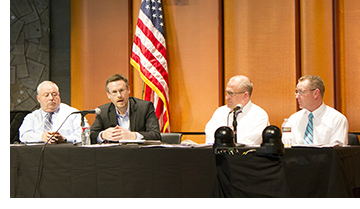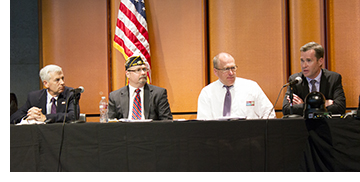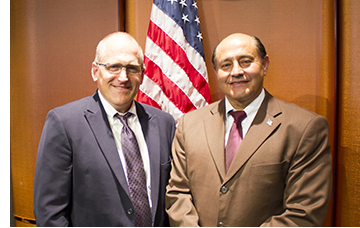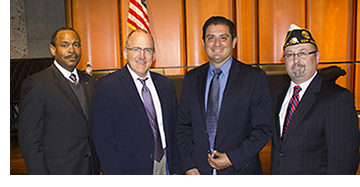Veterans’ employment issues were the focus of discussion at a State Senate informational hearing convened on Feb. 28 at the San Diego Central Library. Peter Callstrom, president and CEO of the San Diego Workforce Partnership (SDWP), was invited to participate in the event, which was organized by the California Employment Development Department (EDD) and Senator Ben Hueso of California’s 40th Senate District and chair of the Senate Veterans Affairs’ Committee. The informational hearing was followed by a job fair focused on veterans and federal contractors.
 Hueso opened the hearing by posing the question, “How can our state do a better job providing services to our veterans in the area of employment?” He noted that this event was vital to addressing important issues raised in last year’s audits, which identified some shortcomings in the methods in which employment services are provided to the 1.8 million veterans in California. According to an analysis of the American Communities Survey data, the unemployment rate among veterans aged 25–34 is 17 percent, as compared to 11 percent among non-veterans in same age group.
Hueso opened the hearing by posing the question, “How can our state do a better job providing services to our veterans in the area of employment?” He noted that this event was vital to addressing important issues raised in last year’s audits, which identified some shortcomings in the methods in which employment services are provided to the 1.8 million veterans in California. According to an analysis of the American Communities Survey data, the unemployment rate among veterans aged 25–34 is 17 percent, as compared to 11 percent among non-veterans in same age group.
“We want veterans to come back from their service and find a job immediately,” Hueso said. “We don’t want them to be inconvenienced through the job-search process. Often there’s a quite substantial amount of barriers, and when you combine that with the delivery of services at the administrative level, the people who lose out are 1) veterans and 2) the taxpayers funding these programs.”
 The event was divided into two panel discussions. Senators Marty Block and Lou Correa—also members of the Senate Veterans’ Affairs Committee—joined Senator Hueso on both panels.
The event was divided into two panel discussions. Senators Marty Block and Lou Correa—also members of the Senate Veterans’ Affairs Committee—joined Senator Hueso on both panels.
The first panel focused on general efforts to increase veteran hiring in California. Panelists included Dennis Petrie, deputy director of the California EDD’s Workforce Services Branch; Paul Cassini, a member of the board of directors for the San Diego Military Advisory Council (SDMAC) and director of business development at Lockheed Martin; Tim Rainey, executive director of the California Workforce Investment Board (WIB); and Callstrom of the SDWP.
Correa, who pursued the commissioning of an audit into the delivery of services for veterans, noted that, “The state of California has to do everything in its power and beyond that call of duty to serve our veterans,” underscoring the need to identify new and innovative ways to solve the service delivery problems.
The EDD’s Petrie outlined a variety of actions geared toward improving veteran assistance:
- Significant investment of energy and funding into upgrading the labor exchange system with a new model—the Integrated Services Delivery Design.
- Working with the Interagency Council on Veterans, with the goal of coordinating the various branches of government and improving the efficiency of delivery.
- Entering into MOUs with the 17 California chapters of the Society for Human Resource Managers (SHRM), bringing the HR professionals into the one-stop career centers to assist with veterans’ résumés and mock interviews.
- Creation of the Veterans Governance Council so that all divisions work together to develop standardized approaches to serving veterans (versus customized approaches).
- The EDD’s 100-day action plan to quickly implement changes to how its services were being delivered.
- The New CalJOBS system, which allows employers to find more easily veterans’ résumés, and allows veterans to more easily identify those employers who have made pledges to hire.
 Callstrom, who partners closely with the EDD through the SDWP, addressed the changes to the New CalJOBS system. “Credit to the EDD and their efforts at improving the system,” he said. “We are really seeing progress and looking forward to implementing the new system more fully.”
Callstrom, who partners closely with the EDD through the SDWP, addressed the changes to the New CalJOBS system. “Credit to the EDD and their efforts at improving the system,” he said. “We are really seeing progress and looking forward to implementing the new system more fully.”
Cassini addressed how the SDMAC has partnered with the California WIB and EDD, and how SDMAC helps link veterans to the myriad services. He also underscored the importance of teaching veterans how to translate their military skills into civilian workforce skills on a résumé or for a job interview.
Callstrom later explained that the AJCC sites offer a range of individual and group courses to help veterans articulate their military skills in civilian-speak: “We work closely with our veterans to find ways to transfer their invaluable leadership experiences to civilian jobs.”
 To this issue, Petrie explained that the New CalJOBS has a Military Occupation Specialty (MOS) translator for the veterans who want to self-serve in the workforce system rather than working with an individual counselor.
To this issue, Petrie explained that the New CalJOBS has a Military Occupation Specialty (MOS) translator for the veterans who want to self-serve in the workforce system rather than working with an individual counselor.
The hearing’s second panel focused on a review of best practices and lessons learned for providing employment services. Panelists included Keith Boylan, deputy secretary of the California Department of Veterans Affairs, Veteran Services Division; Mark Balmert, a member of the SDMAC board of directors and director of strategic planning and business development at AMSEC; Tony Stewart, commander of American Legion Post 434 in Chula Vista and commissioner of the City of Chula Vista’s Veterans Advisory Council; and Callstrom of the SDWP.
Boylan highlighted a variety of challenges facing veterans looking for employment, including translation of skills, mentorship in the workplace, engaging HR professionals, ancillary issues related to PTSD and substance abuse, apprenticeship, and, very importantly, the issue of having an identity that’s separate from the military. To this topic, Stewart explained that when he left the military after 20 years of service, he found himself unprepared and unsure of what to do. “I lost my purpose,” he said. “That’s a pretty big thing when you’re a service member.” He went to the different agencies and had a difficult time with the process. Fortunately, after 10 months, he was able to secure a job.
 Balmart spoke to recent establishment of the Military Transition Support Project, which works to bring together the various veteran-related non-profits to create a coordinated approach—without creating yet another non-profit. “The idea is that the project is focused on the veteran six months before he leaves the service to a year after he leaves the service,” he said. He added that because it’s hard for veterans to know which organizations are legitimate, the participating organizations are all vetted first.
Balmart spoke to recent establishment of the Military Transition Support Project, which works to bring together the various veteran-related non-profits to create a coordinated approach—without creating yet another non-profit. “The idea is that the project is focused on the veteran six months before he leaves the service to a year after he leaves the service,” he said. He added that because it’s hard for veterans to know which organizations are legitimate, the participating organizations are all vetted first.
Correa called upon the multiple parties to work together to find solutions to some of the most complex veterans employment issues. He added, however, that it starts with a simple solution—hiring veterans and remembering that they are part of our family.
A job fair focused on veterans and federal contractors was held immediately after the hearing.
Watch a video of the full hearing here.
